七年级下册英语单元总结
七年级下册英语第一单元知识点总结

七年级下册英语第一单元知识点总结用法集萃1. play +棋类/球类下……棋,打……球2. play the +西洋乐器弹/拉……乐器3. be good at doing sth.= do well in doing sth. 擅长做某事4. be good with sb. 和某人相处地好5. need sb. to do sth. 需要某人做某事6. can + 动词原形能/会做某事7. a little + 不可数名词一点儿……8. join the …club 加入…俱乐部9. like to do sth. =love to do sth. 喜欢/喜爱做某事典句必背1. Can you draw? Yes, I can. / No, I can’t.2. What club do you want to join?I want to join the chess club.3. You can join the English club.4. Sounds good./That sounds good.5. I can speak English and I can also play soccer.6. Please call Mrs. Miller at 555-3721话题写作Dear Sir,I want to join your organization (组织) to help kids with sports, music and English. My name is Mike. I am 15 years old. I’m a student in No. 1 Middle school. I can play the guitar well. I can sing many songs. I can swim and speak English well, too. I think I can be good with the kids. I also do well in telling stories.I hope to get your letter soon.Yours,Mike。
人教版七年级英语下册第一单元知识点总结

Unit One C an you play the guitar一.单词变换:1. 部分动词结尾加er就会变成干这个动作的人。
Eg. Sing(唱歌)----- singer(唱歌者)dance(跳舞)---dancer(舞者)Play(打;演奏)---play (运动员,演奏者)swim(游泳)---swimmer(游泳者)teach (教)--- teacher (教师)2.music n.(音乐)--- musician n.音乐家)piano n.(钢琴--- pianist n.(钢琴家)violin n.(小提琴)---violinist n.(小提琴家)二.重点短语:1. play chess 下国际象棋 2 . speak English 说英语 3. play the guitar 弹吉他4.want to do sth. 想做某事5. join the ...... club 加入...... 俱乐部6.tell stories 讲故事; the story telling club讲故事俱乐部7.be good at sth. / doing sth. 擅长于某事或做某事;be good with sb. 和某人相处得好; 善于应对。
,对。
有办法8.talk to sb. 跟...说talk with sb.和...交谈9. after school 放学后10. play the drums敲鼓;play the piano 弹钢琴;play the violin 拉小提琴11. make friends 结交朋友12. after school(放学后);13. like的用法:like sth. \ like to do sth. \ like doing sth(喜欢某物,喜欢做某事)14. play games with sb. 和某人一起玩游戏15.on weekends = on the weekend 在周末16. help sb.to do \ do sth .帮助某人做某事。
人教版七年级下册英语各单元知识点归纳

5。be good with sb。和某人相处地好be good for有利于
6. can +动词原形能/会做某事[can是照妖镜]
7。a little +不可数名词一点儿……
8。join the…club加入…俱乐部;
9. like to do sth。=love to do sth。=like doing=enjoy doing喜欢/喜爱做某事come to my school
6 No+doing或者No+名词,例如No swimming!No photos!
Unit 5 Why do you like pandas?
◆短语归纳
1. kind of = a little有几分,有点儿,修饰形容词,表示程度
14 want to do想要去做
15 music(音乐)—musician(音乐家)
◆用法集萃
1。play +棋类/球类下……棋,打……球[不戴帽子]
2. play the +乐器弹/拉……乐器[戴帽子]
3. be good at doing sth。= do well in doing sth。擅长做某事
6. It is + adj. + to do sth.做某事是….It是形式主语,不定式是真正的主语
7. Thanks for + n。/ doing感谢你(做)某事。He is like a father to me.【like】是介词,表示“像"8 What do you think of the movie?=How do you like the movie?你认为这部电影总么样?
七年级下册英语手抄报1到3单元总结
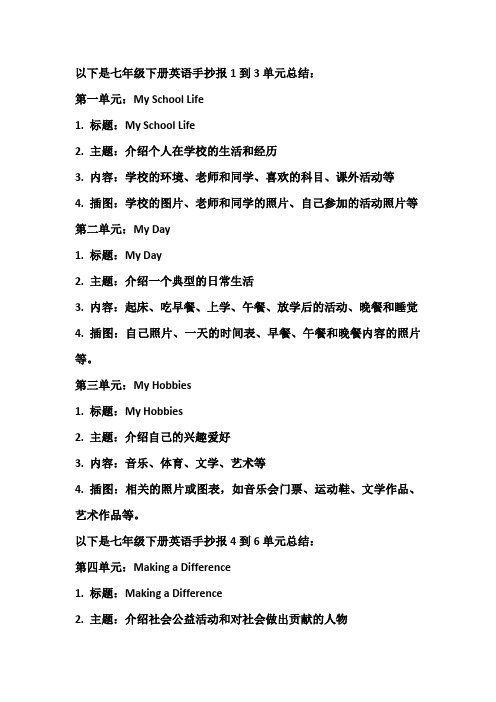
以下是七年级下册英语手抄报1到3单元总结:第一单元:My School Life1. 标题:My School Life2. 主题:介绍个人在学校的生活和经历3. 内容:学校的环境、老师和同学、喜欢的科目、课外活动等4. 插图:学校的图片、老师和同学的照片、自己参加的活动照片等第二单元:My Day1. 标题:My Day2. 主题:介绍一个典型的日常生活3. 内容:起床、吃早餐、上学、午餐、放学后的活动、晚餐和睡觉4. 插图:自己照片、一天的时间表、早餐、午餐和晚餐内容的照片等。
第三单元:My Hobbies1. 标题:My Hobbies2. 主题:介绍自己的兴趣爱好3. 内容:音乐、体育、文学、艺术等4. 插图:相关的照片或图表,如音乐会门票、运动鞋、文学作品、艺术作品等。
以下是七年级下册英语手抄报4到6单元总结:第四单元:Making a Difference1. 标题:Making a Difference2. 主题:介绍社会公益活动和对社会做出贡献的人物3. 内容:志愿者活动、捐款、环保、扶贫等4. 插图:志愿者活动的照片、社会公益活动的海报、做出贡献的人物照片等。
第五单元:Travel with Friends1. 标题:Travel with Friends2. 主题:介绍和朋友一起旅行的经历和感受3. 内容:旅游的地点和活动、和朋友的互动和交流、受到的启发和体验等。
4. 插图:旅游地点的照片、和朋友旅游的照片、各种活动的照片等。
第六单元:Science and Technology1. 标题:Science and Technology2. 主题:介绍不同领域的科技和其对我们生活的影响3. 内容:人工智能、无人驾驶、3D打印、医学技术等。
4. 插图:各种领域的科技产品图、应用场景的照片、科技前沿的海报等。
解释说明:1. My School Life:可以详细描述你的学校生活,包括学校的环境、老师和同学的情况、你最喜欢的科目、社团以及班级活动等。
人教版七年级下册英语各单元知识点总结归纳
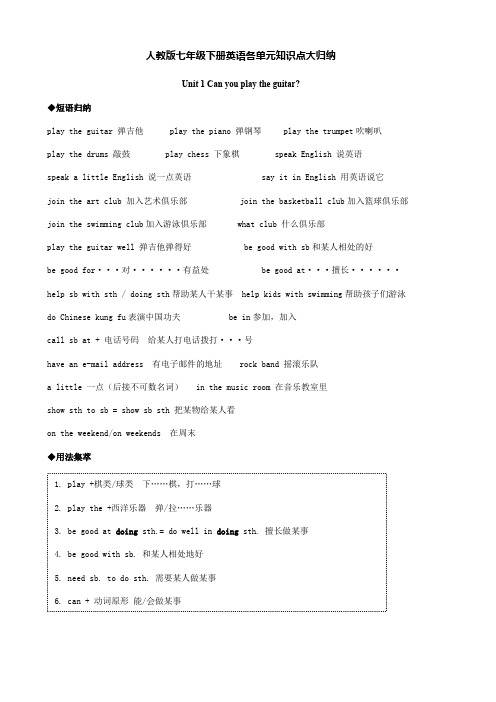
人教版七年级下册英语各单元知识点大归纳Unit 1 Can you play the guitar?◆短语归纳play the guitar 弹吉他 play the piano 弹钢琴 play the trumpet吹喇叭play the drums 敲鼓 play chess 下象棋 speak English 说英语speak a little English 说一点英语 say it in English 用英语说它join the art club 加入艺术俱乐部 join the basketball club加入篮球俱乐部join the swimming club加入游泳俱乐部 what club 什么俱乐部play the guitar well 弹吉他弹得好 be good with sb和某人相处的好be good for···对······有益处be good at···擅长······help sb with sth / doing sth帮助某人干某事 help kids with swimming帮助孩子们游泳do Chinese kung fu表演中国功夫 be in参加,加入call sb at + 电话号码给某人打电话拨打···号have an e-mail address 有电子邮件的地址 rock band 摇滚乐队a little 一点(后接不可数名词) in the music room 在音乐教室里show sth to sb = show sb sth 把某物给某人看on the weekend/on weekends 在周末◆用法集萃1. play +棋类/球类下……棋,打……球2. play the +西洋乐器弹/拉……乐器3. be good at doing sth.= do well in doing sth. 擅长做某事4. be good with sb. 和某人相处地好5. need sb. to do sth. 需要某人做某事6. can + 动词原形能/会做某事◆语法can 能;会;可以【用法】它本身有一定的含义,没有人称和数的变化,但不能单独作谓语,要和动词原形一起构成谓语。
七年级下册英语单元知识点总结道客

七年级下册英语单元知识点总结道客道客七年级下册英语单元知识点总结七年级下册英语单元知识点总结英语学习是我们初中学习的重要一环,对于初中七年级下册英语单元知识点的掌握,不仅能够帮助我们更好地理解课文,还能够提高我们的英语语言能力。
下面是对七年级下册英语单元知识点的总结,希望对同学们的学习有所帮助。
Unit 1: Greetings and Introductions这个单元主要是学习问候和介绍的表达方式。
学习如何问候他人,如何介绍自己和他人的基本信息。
同时,还学习了一些关于国家和国籍的词汇。
Unit 2: School Life这个单元主要是学习关于学校生活的表达方式。
学习如何表达自己的课程安排,学习如何询问他人的学习情况。
同时,还学习了一些学校设施和学习用品的词汇。
Unit 3: Hobbies这个单元主要是学习关于爱好的表达方式。
学习如何表达自己的爱好,学习如何询问他人的爱好。
同时,还学习了一些关于运动、音乐和艺术的词汇。
Unit 4: Family and Friends这个单元主要是学习关于家庭和朋友的表达方式。
学习如何介绍自己的家庭和朋友,学习如何询问他人的家庭和朋友。
同时,还学习了一些家庭成员和人际关系的词汇。
Unit 5: Food and Drinks这个单元主要是学习关于食物和饮料的表达方式。
学习如何点餐和询问他人的饮食习惯。
同时,还学习了一些关于食物和饮料的词汇。
Unit 6: Health and Body这个单元主要是学习关于健康和身体的表达方式。
学习如何描述自己和他人的健康状况,学习如何询问他人的健康状况。
同时,还学习了一些关于身体部位和常见疾病的词汇。
Unit 7: Clothes and Weather这个单元主要是学习关于服装和天气的表达方式。
学习如何描述自己和他人的服装,学习如何询问他人的服装和天气情况。
同时,还学习了一些关于服装和天气的词汇。
Unit 8: Shopping这个单元主要是学习关于购物的表达方式。
人教版七年级英语下册单元知识点总结(全册)
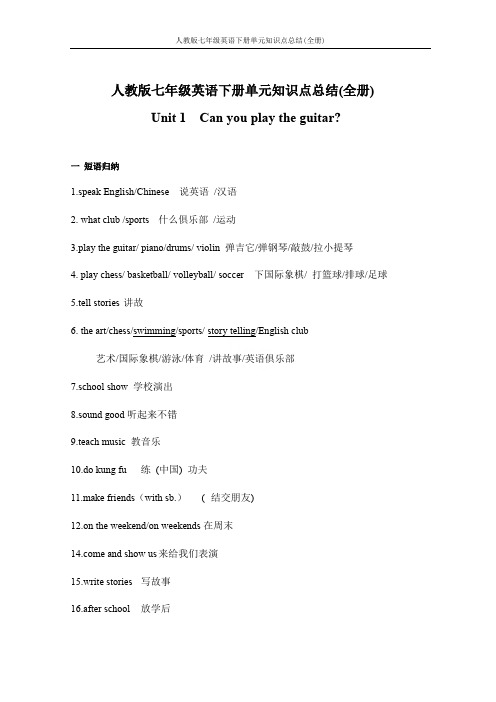
人教版七年级英语下册单元知识点总结(全册)Unit 1 Can you play the guitar?一短语归纳1.speak English/Chinese 说英语/汉语2. what club /sports什么俱乐部/运动3.play the guitar/ piano/drums/ violin 弹吉它/弹钢琴/敲鼓/拉小提琴4. play chess/ basketball/ volleyball/ soccer 下国际象棋/ 打篮球/排球/足球5.tell stories讲故6. the art/chess/swimming/sports/ story telling/English club艺术/国际象棋/游泳/体育/讲故事/英语俱乐部7.school show 学校演出8.sound good听起来不错9.teach music 教音乐10.do kung fu练(中国) 功夫11.make friends(with sb.)(结交朋友)12.on the weekend/on weekends在周末e and show us来给我们表演15.write stories写故事16.after school放学后17.English-speaking students说英语的学生18.play games 做游戏19.the Students’ Sports Center学生运动中心20.at the old people’s home在老人之家21.be in our school music festival 参加学校音乐节22.jion the music club加入音乐俱乐部二用法集萃1. play +棋类/球类下……棋,打……球2. play the +乐器弹/拉……乐器3. be good at doing sth.擅长做某事be good for.. 对… 有好处be good /kind to … 对… 友好4. be good with sb. 和某人相处地好; 善于应付(处理)…5. need(sb./sth.)to do… 需要(某人/某物)做….6. can + 动词原形能/会做某事7. a little + 不可数名词: 一点儿……9. like to do sth.或like doing sth. 喜欢做某事10.want to do…想做……11.What about…?…怎么样?(后面接Ving/代词/名词)12. talk用法: talk to/with sb. 跟某人说话talk about sth. 谈论某事tell 用法:tell sb sth. 告诉某人某事tell sb to do sth 告诉某人去做某事tell stories 讲故事say用法:say直接加说话的内容/itspeak用法:speak +语言13.help sb. with sth在某方面帮助某人= help sb.(to)do sth14.be free /busy有空/很忙15. call sb. at+号码拨打某人的……号码16. be in=join …成为…中的一员(P6)17.want …for the school show为学校表演招聘……三典句必背1. Can you draw? 你会画画吗?Yes, I can. / No, I can’t.是,我会。
七年级英语下册单元知识点总结
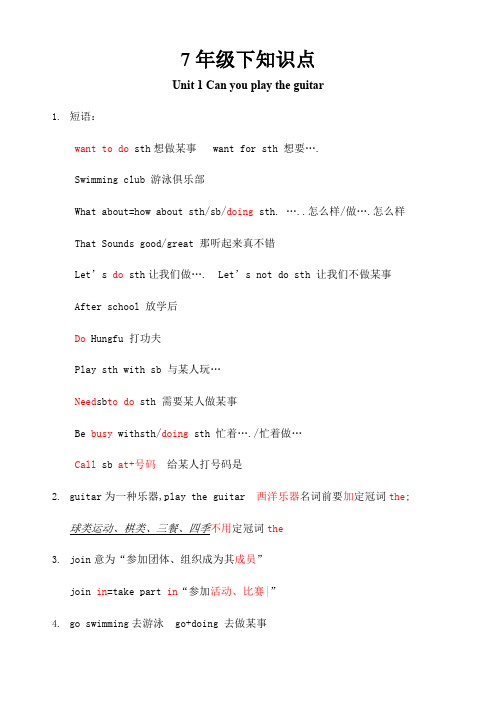
7年级下知识点Unit 1 Can you play the guitar1.短语:want to do sth想做某事 want for sth 想要….Swimming club 游泳俱乐部What about=how about sth/sb/doing sth. …..怎么样/做….怎么样 That Sounds good/great 那听起来真不错Let’s do sth让我们做…. Let’s not do sth 让我们不做某事After school 放学后Do Hungfu 打功夫Play sth with sb 与某人玩…Need sb to do sth 需要某人做某事Be busy withsth/doing sth 忙着…./忙着做…Call sb at+号码给某人打号码是2.guitar为一种乐器,play the guitar 西洋乐器名词前要加定冠词the;球类运动、棋类、三餐、四季不用定冠词the3.join意为“参加团体、组织成为其成员”join in=take part in“参加活动、比赛|”4.go swimming去游泳go+doing 去做某事5.注意区分:speak, say, talk和tella)①say说话 What can you sayb)②speak+语言c)③talk表示两个人或多个人在一起讲话、谈论多指随意谈论talk with sb与某人交谈 talk to sb 向某人说… talk about谈论…;d)④tell的意思是“告诉,讲述,吩咐”,讲故事或讲笑话多用tell;6.Show “表演,演出,出示……给某人看”, show sth. to sb.=show sb. sth.;7.show作名词,意为“展览,展出”on show “在展出” car show 车展;school show 学校公演fashion show 时装表演;a flower show花展8.help sth. 在……方面帮助某人help sth.帮助某人….. help sth.帮助某人干什么;a)I often help him do his homework.b)I often help him his homework.9.be good with... 与……相处得好;与……合得来=get on well withbe good at doing sth擅长做某事 be good for对……有益处;be good to sb 对某人好10.Can you play the guitar你能弹吉他吗情态动词:不能单独做谓语动词;无人称、单复数变化;后接动词原形1.表示能力能;会;如:He can speak English.他会说英语;2.表示许可,意为“可以”,这时可以和may通用,但是比may较正式;如:Can I use your pen我可以用你的钢笔吗3.表示可能性,意为“可能”,这时常出现在否定句中;如:It can’t be true.这不可能是真的;4.表示提供帮助;如:Can you help me你可以帮助我吗1.肯定句:主语+can+动词原形+其他;如:2.否定句:主语+can’t+动词原形+其他;如:3.一般疑问句:Can+主语+动词原形+其他肯定答语:Yes,主语+can.否定答语:No,主语+can’t.如:4.特殊疑问句:疑问词+can+主语+动词原形+其他如:What can I do for you我能为你做点什么呢Unit 2 What time do you go to school1.重点短语:get up 起床 get dressed 穿衣服 get on上车 get off 下车get home到达家中get to work到达工作岗位practice guitar 练吉它 practice doing sth练习做…leave home 离家take a shower = have a shower 洗淋浴澡have/eat breakfast/dinner/lunch 吃早、晚、午饭go to bed 睡觉反义词get upput on 穿衣服反义词take offdo one’s homework 做家庭作业tell sb. about sth. 告诉某人某事love to do = like to do 喜欢干某事 like doing sth at around/about six o’clock 六点左右in the morning/afternoon/evening 在早上/下午/晚上listen to 听…on weekends=at the weekend 在周末on school days 在学校上课日late for… …. 迟到了lots of =a lot of 许多a good /bad habit 好习惯take a walk=have a walk 散步live a happy life 过着幸福的生活2英语时间的表达What is the time 几点了It’s….1直接法:6:10 →six-ten 8:50→eight-fifty6:00 →six o’clocko’clock可省2借助介词to/past分钟数+to/past+小时小于等于30分钟“past” 超过10:15→ a quarter past ten或fifteen past ten 9:30→half past nine或thirty past nine大于30分钟“to”差….到….翻译时要注意时钟要加111:50→ten to twelve9:45→a quarter to ten或fifteen to ten3 what time与when的区别what time “几点”问的是具体的时间,回答要具体到小时;What time do you go to school你什么时候/几点上学when提问,回答既可以是具体的时间,也可以是不具体的时间,如:in the morning,last year,in 1998等范围大的时间;例如:When does he take a shower他什么时候洗澡He takes a shower in the morning.他在早上洗澡;也可用具体时间:I take a shower at 6 o’clock in the morning.我早上六点洗澡;3、 listen to, hear和sound△listen to意为“注意听”,表示有意识地去听,但不一定听得见什么,强调听的动作;They are listening to the teacher. 他们在听老师说;△hear意为“听见”,强调听的结果;如:I’m sorry to hear that.听到那个消息我很难过;△sound意为“听起来,听上去”,可作系动词+形容词The music sounds sweet. 这音乐听起来悦耳;Unit 3 How do you get to school1、重点短语搭配take the subway 乘地铁every day 每天think of 认为 think about 考虑between…and….在…和…之间 next to在旁边come true 实现I think so 我也这样认为I don’t think so 我不这样认为It’s easy /difficult for sb to do sth 对某人而言做什么是很容易/困难的it is easy to get to school到达学校很容易on a ropeway 坐缆索cross the river 穿过河流one 11-year-old boy 一个11岁的男孩红色部分为一个形容词I’m 11years old 我11岁quickly 动作上快 fast 速度上快 soon时间上快the river runs quickly 河水流的快ten minutes’ walk / a ten-minute walk =10 minutes on foot 10分钟的路be afraid to do/ be afraid of sth / doing害怕做某事why not +v原形 == why don’t you +v原形为什么不...........how to do it 怎么来做它what to do 做什么what do you think of =how do you like你觉得怎么样how long does it take sb to do sth花费某人多长时间做某事crossing the river is… 穿过河是…ing型动词做主语谓语动词用单数2、How do you get to school你怎样到达学校交通方式的表达:1 take/ride/drive + a/the +交通工具take a bus/car…2by +交通工具 by bus/car3on/in + a/the +交通工具in:封闭/半封闭/小型工具;on:大型4ride/fly/drive to +交通工具= go to +地点+by+交通工具walk to+地点= go to+地点on foot.eg: I drive to school every day.= I go to school by carI walk to school every day.= I go to school on foot3、spend, cost, pay 与 take区别(1)spendsb spend…on sth或spend…in doing sth.意为“某人花时间/金钱做某事”;eg: I spent 5 dollars on the book.=I spend 5 dollars buying the book.(2)coststh cost sb some money意为“某物花费某人多少钱”;eg: The skirt costs her 200 yuan.(3)paysb pay money for sth.意为“某人为某物付款”;eg: He paid 1000 yuan for the TV set.(4)takeIt takes sb time/ money to do sth.eg: It took him seven days to make the big cake.4、Then the early bus takes him to school.take…to…意为“把…带去…” bring….to….把…带来….5、how far用来提问距离,意为“多远;How far is it from A to B=How far is B from A A 到B有多远①用长度单位表示eg: —— How far is it from your home to the bus stop ——It’s five kilometers.②用时间表示eg: —— How far is the park from the shop——It’s ten minutes’ walk.6、how long 用来提问时间,意为“多久”;eg: —— How long have you been in America—— For two years. for+短时间表示“长达…”7、say, speak, talk与tell8、look, read, see与watch9、there be 句型就近原则There is no bridge=there is not a bride 这儿没有桥◆unit 4 Don’t eat in class.1、重点短语与句型on time准时 in time 及时fight for 为….而斗 fight against 为反对….而战斗 fight with 与…一起战斗go outsider 去外面It’s important for sb to do sth 对…人而言做…是很重要的practice sth/ doing sth 练习…/练习做…do the dishes 清洗餐具make bed 铺床be strict with sb 对某人严格remember/forget to do sth 记得/忘记要做…remember/forget doing sth 记得/忘记做过…follow the rules 遵守规则learn from sb/sth 从…..学习 learn to do sth 学会做某事be late for school 上学迟到have to 不得不don’t have to=needn’t 不必 must 的一般疑问句否定回答school uniform 校服on school nighs 在上学日的晚上too much+不可数名词“太多” too many +可数名词的复数“太多”much too + 形容词/副词“太….”in the kitchen 在厨房let/make/have sb do sth 让某人做某事good luck 好运keep+形容词保持… keep quiet 保持安静=be quietkeepsb doing sth 一直做某事 He keeps me waiting for him a long time. 他让我等了他很久keep sb from doing sth 阻止某人做某事have fun doing sth 很高兴做某事。
第一单元七年级下册英语总结
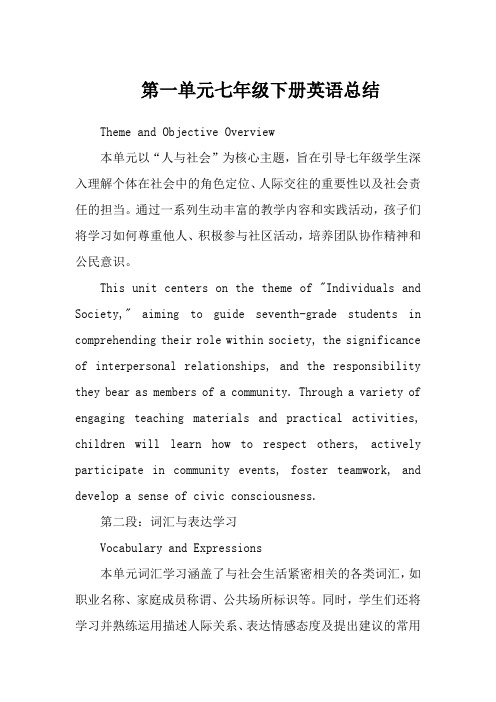
第一单元七年级下册英语总结Theme and Objective Overview本单元以“人与社会”为核心主题,旨在引导七年级学生深入理解个体在社会中的角色定位、人际交往的重要性以及社会责任的担当。
通过一系列生动丰富的教学内容和实践活动,孩子们将学习如何尊重他人、积极参与社区活动,培养团队协作精神和公民意识。
This unit centers on the theme of "Individuals and Society," aiming to guide seventh-grade students in comprehending their role within society, the significance of interpersonal relationships, and the responsibility they bear as members of a community. Through a variety of engaging teaching materials and practical activities, children will learn how to respect others, actively participate in community events, foster teamwork, and develop a sense of civic consciousness.第二段:词汇与表达学习Vocabulary and Expressions本单元词汇学习涵盖了与社会生活紧密相关的各类词汇,如职业名称、家庭成员称谓、公共场所标识等。
同时,学生们还将学习并熟练运用描述人际关系、表达情感态度及提出建议的常用句型和短语。
如,“He is a doctor.”、“She is my aunt.”、“Please be quiet in the library.”、“I suggest we volunteer at the local charity event.”等,使他们在实际交流中能准确、得体地表达思想。
初一下册英语知识点总结归纳

初一下册英语知识点总结归纳第一章 Hello! (你好!)1. 问候语:Hello! Hi! Good morning/afternoon/evening! How are you? I'm fine, thank you. And you?2. 家庭成员表达:father, mother, sister, brother, grandfather, grandmother等。
3. 介绍自己:My name is... I am... years old. I am a student. I come from...第二章 Classroom language (教室用语)1. 基本课堂用语:sit down, stand up, open your book, close your book, listen, repeat, read, write等。
2. 数字表达:1-20。
3. 询问问题:What's this/that? What color is it? Is it...? Are they...?第三章 My schoolbag (我的书包)1. 物品名称:book, pen, pencil, ruler, eraser, bag, pencil case等。
2. 形容词:big, small, long, short, tall等。
3. 数量词:one, two, three等。
4. 句型:This is my... These are my...第四章 My classroom (我的教室)1. 教室物品:desk, chair, blackboard, whiteboard, map等。
2. 位置词:in, on, under, behind等。
第五章 My body (我的身体)1. 身体部位:head, eyes, ears, nose, mouth, hand, arm, leg, foot等。
新人教版七年级英语下册知识点总结

新人教版七年级英语下册知识点总结Unit 1 Can you play the guitar?◆短语归纳1. play chess下国际象棋2. play the guitar弹吉他3. speak English说英语4. English club英语俱乐部5. talk to跟 (6)play the violin拉小提琴7. play the piano弹钢琴8. play the drums敲鼓9. make friends结交朋友10. do kung fu练(中国)功夫11. tell stories讲故事12. play games做游戏13. on the weekend/on weekends在周末◆用法集萃1. play +棋类/球类下……棋,打……球2. play the +西洋乐器弹/拉……乐器3. be XXX.擅长做某事4. be good with sb.和或人相处地好5. need sb. to do sth.需求或人做某事6. can +动词原形能/会做某事7. a little +不成数名词一点儿……8.join the …club插手…俱乐部9. like to do sth. =love to do sth.喜爱/爱好做某事◆典句必背1. Can you draw?Yes, I can. / No, I can’t.2. What club do you want to join?I want to join the chess club.3. You can join the English club.4. XXX.5. I can speak English and I can also play soccer.6. Please call Mrs. Millerat555-3721.Unit 2 What time do you go to school?◆短语归结1. what time几点4. XXX洗淋浴7. do homework做家庭功课2. go to school去上学5. XXX刷牙3.getup起床6.getto到达8. go to work去上班9.XXX回家12.gethome10. XXX吃早饭11. get dressed穿上衣服到家13.either…or…要么…要么…14. go to bed上床睡觉15. XXX在上午/下战书/早晨16. take a walk漫步17. lots of=a lot of很多,大量电台19. XXX在晚上20. be XXX迟到◆用法集萃1. at +详细工夫点在几点(几分)2. XXX/XXX吃早饭/午饭/晚饭3. XXX基数词……点半4. XXX基数词差一刻到……点处置……举动5. take a/an +名词- 1 -6.从……到……from …to …7. need to do sth需要做某事18.XXX◆典句必背XXX.3. When do students usually eat dinner?They usually eat XXX XXX.4. In the evening, I either watch TV or play computer games.5. At twelve, XXX..6.She knows it’s not good for her, but it tastes good.7. Here are your XXX.◆短语归结1. get to school抵达黉舍2. take the XXX乘地铁3.XXX骑自行车4. how far多远5. from home to school从家到学校6.every day每天7. take the bus乘公共汽车8. by XXX骑自行车9.busstop 公共汽车站10. think of认为11.between … and …在…和…之间12. one 11-year-old boy一个11岁的男孩13.play with …和…玩14. come true完成15. have to不能不◆用法集萃1.take… to …= go to … by…乘…去…2. How do / does(sb)get to …?…是如何到…的?3.How far is it from … to …?从…到…有多远?4. It takes sb. some time to do sth.做某事破费或人多长工夫。
英语七下各单元知识点归纳
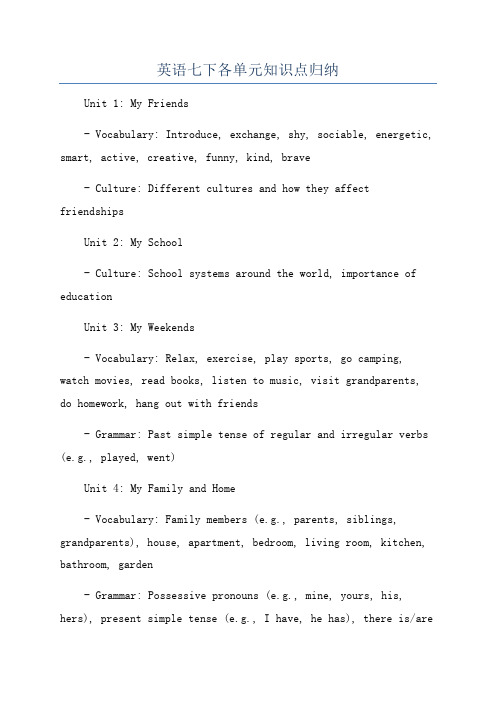
英语七下各单元知识点归纳Unit 1: My Friends- Vocabulary: Introduce, exchange, shy, sociable, energetic, smart, active, creative, funny, kind, brave- Culture: Different cultures and how they affectfriendshipsUnit 2: My School- Culture: School systems around the world, importance of educationUnit 3: My Weekends- Vocabulary: Relax, exercise, play sports, go camping, watch movies, read books, listen to music, visit grandparents, do homework, hang out with friends- Grammar: Past simple tense of regular and irregular verbs (e.g., played, went)Unit 4: My Family and Home- Vocabulary: Family members (e.g., parents, siblings, grandparents), house, apartment, bedroom, living room, kitchen, bathroom, garden- Grammar: Possessive pronouns (e.g., mine, yours, his, hers), present simple tense (e.g., I have, he has), there is/are- Culture: Different types of family structures, howcultures define "home"Unit 5: My Day- Vocabulary: Wake up, get up, brush teeth, wash face, have breakfast, go to school, have classes, do homework, have dinner, watch TV, go to bed- Culture: Different daily routines in different cultures, importance of routinesUnit 6: My Hobbies- Vocabulary: Play chess, play the piano, play soccer, swim, dance, draw, paint, collect stamps, books, coins, go hiking, play video games- Grammar: Likes and dislikes (e.g., I like playing soccer, I don't like swimming)- Culture: Different hobbies in different cultures, importance of hobbies for personal developmentUnit 7: My Outfit- Vocabulary: T-shirt, blouse, shirt, pants, skirt, dress, jeans, jacket, shoes, sneakers, sandals, hat, sunglasses - Grammar: Present continuous tense (e.g., I am wearing a T-shirt), demonstrative pronouns (e.g., this, that, these, those)- Culture: Fashion trends and styles in different cultures, importance of clothing choice for self-expressionUnit 8: My Neighborhood- Vocabulary: Park, supermarket, post office, bank, hospital, library, theater, museum, restaurant, train station, bus stop, street- Grammar: Prepositions of location (e.g., next to, across from, between), imperatives (e.g., go straight, turn right)。
七年级下学期英语各章节重要内容归纳

七年级下学期英语各章节重要内容归纳第一章:学校生活- 学科和教室- 学校设施和设备- 学校规则和制度- 课程时间表和课堂活动第二章:我的家庭- 家庭成员和亲戚关系- 家庭成员的职业和兴趣爱好- 家庭规则和家庭活动- 家庭成员之间的相处方式第三章:我的城市- 城市名称和地理位置- 城市景点和旅游景点- 城市交通和交通方式- 城市的文化和传统第四章:我的课余活动- 研究和爱好- 校外活动和俱乐部- 社交媒体和娱乐活动- 个人兴趣和追求第五章:购物和服装- 商店和市场- 购物的常用英语表达- 服装和时尚趋势- 参观商店和挑选服装第六章:健康和运动- 健康惯和饮食- 锻炼和运动方式- 平衡研究和休息- 保持健康的重要性第七章:节日和庆祝活动- 重要节日和传统俗- 节日庆祝活动和食物- 节日的意义和重要性- 节日庆祝的方式和惯第八章:环境保护- 环境问题和污染- 环境保护的重要性- 减少污染的方法和措施- 环境友好的生活方式第九章:世界各地的人们- 不同国家和地区的人们- 语言和文化差异- 人们的生活方式和传统- 尊重和理解不同文化背景的重要性第十章:未来的计划和梦想- 个人目标和职业梦想- 未来计划和学业规划- 实现梦想的方法和步骤- 努力和坚持的重要性以上是七年级下学期英语各章节的重要内容归纳。
每个章节都涉及不同主题,帮助学生了解和掌握相关的词汇和表达。
学生可以通过学习这些内容来提高英语水平和跨文化交流能力。
七年级英语下册-全册知识点梳理
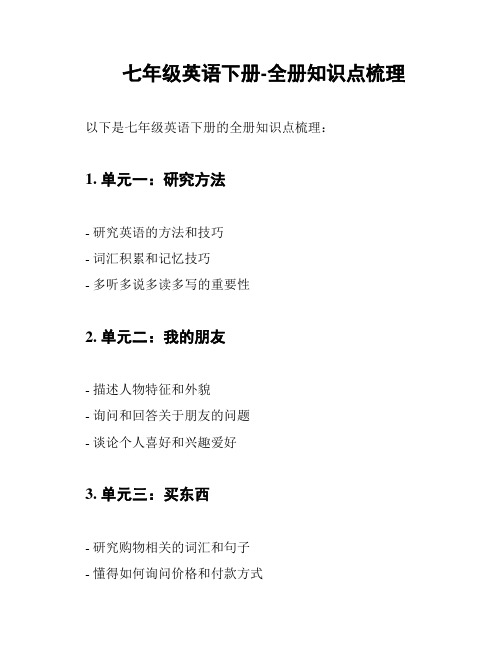
七年级英语下册-全册知识点梳理以下是七年级英语下册的全册知识点梳理:
1. 单元一:研究方法
- 研究英语的方法和技巧
- 词汇积累和记忆技巧
- 多听多说多读多写的重要性
2. 单元二:我的朋友
- 描述人物特征和外貌
- 询问和回答关于朋友的问题
- 谈论个人喜好和兴趣爱好
3. 单元三:买东西
- 研究购物相关的词汇和句子
- 懂得如何询问价格和付款方式
- 学会表达自己的购物意愿和偏好4. 单元四:我的学校
- 研究学校相关的词汇和句子
- 描述学校和课堂环境
- 谈论研究内容和学科
5. 单元五:我的生活
- 研究日常生活相关的词汇和句子- 描述自己的生活惯和家庭
- 谈论日常活动和时间安排
6. 单元六:我的假期
- 研究度假和旅行相关的词汇和句子- 描述过去和将来的假期计划
- 谈论旅行经历和感受
7. 单元七:我喜欢运动
- 研究运动项目和运动器材的词汇
- 喜欢和不喜欢的表达方式
- 谈论个人的体育运动经验和兴趣爱好
这份文档梳理了七年级英语下册的全册知识点,希望对你的学习有所帮助。
人教版七年级英语下册各单元考点总结

They are kind of/very shy.他们有点儿害羞/非常害羞。
二、考点解析
1.Let’s do sth, let’s=let us 让我们做…… 人称代词用宾格 Let’s 之后跟动词原形。
What are you doing? 你在干什么 I am doing my homework. 我正在做我的家庭作业。
Where are you swimming? 你在哪里游泳 I am swimming at the pool. 我在水池里游泳。
Who is the boy talking to? 这个男孩在对谁说话 He is talking to his teacher.他在对他的老师谈话。
暖的/冷的/凉爽的。 2. How’s
it going? 近况如何 –Great./Not bad/pretty good/ Just so so/ terrible/Boring.很棒/不错/相当好/一般般
/糟糕/无聊的 3. Is Aunt Wang there? 王阿姨在那儿吗 –Yes,she is 是的她在。 /No,she isn’t.不,她不再。
What are you doing?你在干什么 I’m watching TV.我在看电视。
Do you want to go swimming?你想去钓鱼吗 Yes, I do. No, I don’t.
When do you want to go? 你什么时候想去 At three o’ clock.在三点钟。
3.give sb sth=give sth to sb 给某物给某人 4. get sth from sb 从某人出得到某物
七年级下册英语单元全册知识点归纳与复习总结
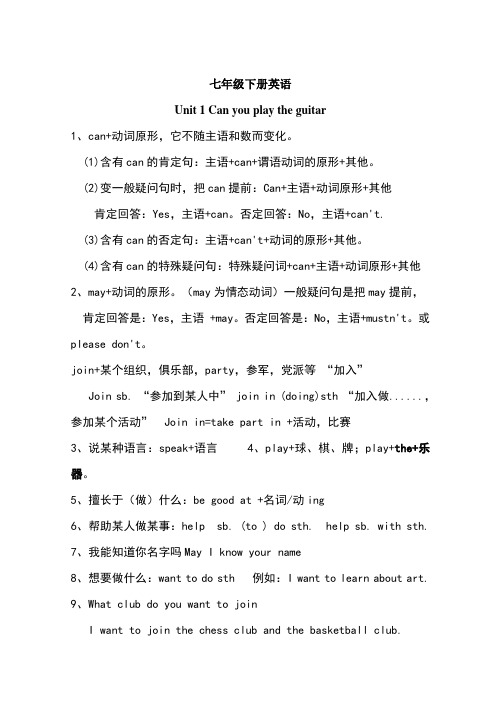
七年级下册英语Unit 1 Can you play the guitar1、can+动词原形,它不随主语和数而变化。
(1)含有can的肯定句:主语+can+谓语动词的原形+其他。
(2)变一般疑问句时,把can提前:Can+主语+动词原形+其他肯定回答:Yes,主语+can。
否定回答:No,主语+can't.(3)含有can的否定句:主语+can't+动词的原形+其他。
(4)含有can的特殊疑问句:特殊疑问词+can+主语+动词原形+其他2、may+动词的原形。
(may为情态动词)一般疑问句是把may提前,肯定回答是:Yes,主语 +may。
否定回答是:No,主语+mustn't。
或please don't。
join+某个组织,俱乐部,party,参军,党派等“加入”Join sb. “参加到某人中” join in (doing)sth “加入做......,参加某个活动” Join in=take part in +活动,比赛3、说某种语言:speak+语言4、play+球、棋、牌;play+the+乐器。
5、擅长于(做)什么:be good at +名词/动ing6、帮助某人做某事:help sb. (to ) do sth. help sb. with sth.7、我能知道你名字吗May I know your name8、想要做什么:want to do sth 例如:I want to learn about art.9、What club do you want to joinI want to join the chess club and the basketball club.10、What club does Tom want to join He wants to join the swimming club .11、He can’t play the violin or the piano. Can you help kids with swimming12、Why do you want to join the English club Because I want to learn English well.Unit 2 What time do you go to school1、what time和when引导的特殊疑问句。
七年级下册英语单元总结外研版
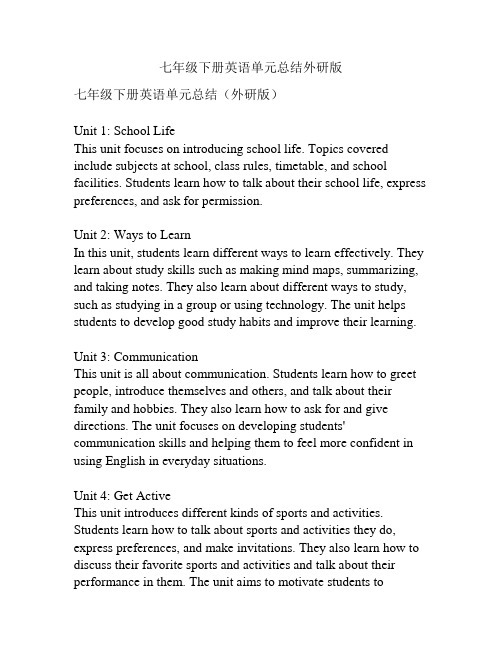
七年级下册英语单元总结外研版七年级下册英语单元总结(外研版)Unit 1: School LifeThis unit focuses on introducing school life. Topics covered include subjects at school, class rules, timetable, and school facilities. Students learn how to talk about their school life, express preferences, and ask for permission.Unit 2: Ways to LearnIn this unit, students learn different ways to learn effectively. They learn about study skills such as making mind maps, summarizing, and taking notes. They also learn about different ways to study, such as studying in a group or using technology. The unit helps students to develop good study habits and improve their learning. Unit 3: CommunicationThis unit is all about communication. Students learn how to greet people, introduce themselves and others, and talk about their family and hobbies. They also learn how to ask for and give directions. The unit focuses on developing students' communication skills and helping them to feel more confident in using English in everyday situations.Unit 4: Get ActiveThis unit introduces different kinds of sports and activities. Students learn how to talk about sports and activities they do, express preferences, and make invitations. They also learn how to discuss their favorite sports and activities and talk about their performance in them. The unit aims to motivate students toparticipate in sports and develop a healthy lifestyle.Unit 5: HobbiesIn this unit, students learn how to talk about their hobbies and interests. They learn how to describe activities and express preferences. They also learn how to make plans and talk about future arrangements. The unit encourages students to pursue their interests and develop their hobbies.Unit 6: The Natural WorldThis unit focuses on the natural world. Students learn about different animals, plants, and natural phenomena. They learn how to describe animals, talk about their habitats, and express concerns about the environment. The unit aims to raise students' awareness of the importance of protecting the natural world.Unit 7: ShoppingIn this unit, students learn how to talk about shopping. They learn how to describe clothes and accessories, talk about prices, and ask for and give opinions. They also learn how to shop for food and groceries and talk about quantities. The unit helps students to develop practical skills for shopping and improve their ability to communicate in a commercial context.Unit 8: Health and FitnessThis unit focuses on health and fitness. Students learn how to talk about health problems, describe symptoms, and give advice. They also learn how to talk about healthy lifestyles, exercise routines, and personal habits. The unit aims to develop students' awareness of the importance of health and motivate them to maintain ahealthy lifestyle.Unit 9: FestivalsIn this unit, students learn about different festivals celebrated in English-speaking countries. They learn how to talk about festivals, describe traditions, and express wishes and blessings. They also learn how to make holiday plans and talk about past experiences. The unit introduces students to different cultures and traditions and encourages cross-cultural understanding.Overall, the seventh-grade English curriculum focuses on developing students' communication skills, expanding their vocabulary and grammar knowledge, and raising their awareness of different cultures and lifestyles. Students learn how to express themselves effectively, communicate in everyday situations, and develop good study habits.。
- 1、下载文档前请自行甄别文档内容的完整性,平台不提供额外的编辑、内容补充、找答案等附加服务。
- 2、"仅部分预览"的文档,不可在线预览部分如存在完整性等问题,可反馈申请退款(可完整预览的文档不适用该条件!)。
- 3、如文档侵犯您的权益,请联系客服反馈,我们会尽快为您处理(人工客服工作时间:9:00-18:30)。
七年级下册英语语法点Unit 1 Where’s your pen pal from?一.短语:1 .be from = come from 来自于----2. live in 居住在---3. on weekends 在周末4 .write to sb = write a letter to sb 给某人写信;写信给某人5 .in the world 在世界上in China 在中国6.pen pal 笔友14 years old 14岁favorite subject 最喜欢的科目7.the United States 美国the United Kingdom 英国New York 纽约8.speak English 讲英语like and dislike 爱憎9.go to the movies 去看电影play sports 做运动二.重点句式:1 Where does he live?2 What language(s) does he speak?3 I want a pen pal in China.4I can speak English and a little French.5 Please write and tell me about yourself.6 Can you write to me soon?7I like going to the movies with my friends and playing sports.三.本单元的国家,人民、语言对应。
1 Canada---- Canadian---- English / French2 France------ French------French3 Japan------Japanese----Japanese4 Australia----Australian----- English5 the United States------ American---- English6 the United Kingdom---British----- EnglishUnit 2 Where’s the post office?一. Asking ways: (问路)1. Where is (the nearest) ……?(最近的)……在哪里?2. Can you tell me the way to ……?你能告诉我去……的路吗?3. How can I get to ……?我怎样到达……呢?4. Is there …… near here / in the neighborhood? 附近有……吗?5. Which is the way to ……?哪条是去……的路?二.Showing the ways: (指路)1. Go straight down / along this street. 沿着这条街一直走。
2. Turn left at the second turning. 在第二个路口向左转。
3. You will find it on your right. 你会在你右手边发现它。
4. It is about one hundred metres from here. 离这里大约一百米远。
5. You’d better take a bus. 你最好坐公交车去。
(You’d better+动词原形)三.词组1. across from ……在……的对面 across from the bank 在银行的对面2. next to……紧靠…… next to the supermarket 紧靠超市3. between……and……在……和……之间between the park and the zoo 在公园和动物园之间among 表示位于三者或三者以上之间4. in front of……在……前面There is a tree in front of the classroom.课室前面有棵树。
in the front of……在……(内)的前部There is a desk in the front of the classroom.课室内的前部有张桌子。
5. behind……在……后面 behind my house 在我家后面6. turn left/ right 向左/右拐on the left/right of……在某物的左/右边on the left of our school 在我们学校的左边on one’s left/right 在某人的左/右边 on my left 在我左边7. go straight 一直走8. down /along……沿着……(街道)down/along Center Street 沿着中央街9. in the neighborhood=near here 在附近10 welcome to……欢迎来到……11. take /have a walk 散步12. the beginning of…………的开始,前端at the beginning of……在……的开始,前端in the beginning 起初,一开始13. have fun=have a good time=enjoy oneself 玩得开心,过得愉快我昨天玩得很开心。
I had fun yesterday.I had a good time yesterday.I enjoyed myself yesterday.14. have a good trip 旅途愉快15. take a taxi 坐出租车16. 到达:get to +地方get here/ there/ home 到这/那/家arrive in +大地方 I arrive in Beijing.arrive at +小地方 I arrive at the bank.reach +地方17.go across 从物体表面横过 go across the street 横过马路go through 从空间穿过 go through the forest 穿过树林18.on + 街道的名称。
Eg: on Center Streetat + 具体门牌号+街道的名称 Eg: at 6 Center Street三.重难点解析1.enjoy doing sth 享受做某事的乐趣,喜爱做某事I enjoy reading. 我喜爱读书。
到目前为止,我们学了两个特殊的动词finish和enjoy,都是要带 doing.I finish cleaning the room. 我扫完了这间屋子。
2.hope to do sth 希望做某事I hope to pass this exam. 我希望通过这次考试。
hope +从句 I hope tomorrow will be fine. 我希望明天将会晴朗。
(从句即是一个小句子,这个小句子又放在大句子中,从属于大句子,所以叫从句。
如tomorrow will be fine是一个从句,它又放在I hope 的后面,形成句中有句。
)3. if 引导一个表示假设的句子。
If I have much money, I will go to the moon. 如果我有许多钱,我就会去月球。
If you are hungry, you can buy some food in the supermarket.如果你饿了的话,你可以在超市买一些食物。
四.本单元的反义词、近义词配对1new—old 2 quiet--- busy 3 dirty--- clean 4 big---- smallUnit 3 Why do you like koala bears?一.重点词组eat grass eat leaves be quiet very shy very smart very cuteplay with her friends kind of South Africa other animalsat night in the day every day during the day二. 交际用语1. Why do you like pandas? Because they’re very clever.2. Why does he like koalas? Because they’re kind of interesting.3. Where are lions from? They are from South Africa.4. What other animals do you like?I like dogs, too.Why?Because they’re friendly and clever.5. Molly likes to play with her friends and eat grass.6. She’s very shy.7. He is from Australia.8.He sleeps during the day, but at night he gets up and eats leaves. 9.He usually sleeps and relaxes 20 hours every day.10.Let’s see the pandas first.11.They’re kind of interesting.12.What other animals do you like?13.Why do you want to see the lions?三. 重点难点释义1、kind of 有点,稍微Koala bears are kind of shy. 考拉有点害羞。
kind 还有“种类”的意思如:各种各样的 all kinds ofWe have all kinds of beautiful flowers in our school.2、China n. 中国 Africa n. 非洲China 和Africa都是专有名词,首字母都应该大写,而且和介词in连用。
There are many kinds of tigers in China.There are many kinds of scary animals in Africa.3、friendly adj. 友好的,和蔼可亲的它是名词friend的形容词形式,常常和be动词连用, be friendly。
The people in Chengdu are very friendly.4、with prep. 跟,同,和…在一起I usually play chess with my father.注意区别与and的用法,and通常用于连接主语或宾语,连接主语时,如果有I, I通常放在 and 之后,如:My father and I usually play chess together.Play with “和…一起玩耍”“玩…”I often play with my pet dog.Don’t play with water!5、day和night 是一对反义词,day 表示白天或一天,night表示夜或夜晚。
